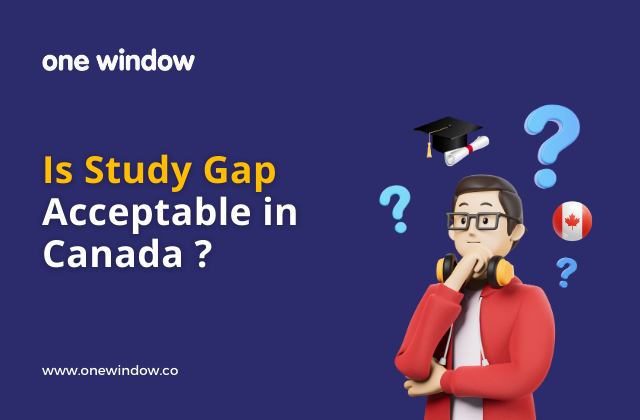IS STUDY GAP ACCEPTABLE IN CANADA?
Canada is one of the most preferred study abroad destinations in the world because of its prestigious schools, low tuition rates, and warm atmosphere. Canada has a very adaptable educational system, and many universities are willing to accommodate students taking time off between degrees. Students applying to associate’s, bachelor’s, and master’s programmes may take a one-year break between courses, while those applying to doctoral programmes may take up to five years.
What is a study gap?
A student’s “study gap” occurs whenever they stop actively pursuing further education. During this time, they are free to pursue a wide range of other pursuits, such as taking a gap year to get work experience or preparing for an entrance or competitive exam.
Is the study gap accepted by Canadian universities and colleges?
Gaps in education are generally recognised at Canadian universities and colleges, though the exact length of time allowed may vary. Canadian universities have varying policies when it comes to the number of years students can take off between degrees. Taking a year or more off before enrolling at a university overseas is common among students from other countries. In addition, candidates should provide documentation and reasonable justifications to back up their gap year claim.
How many years of a study gap are accepted in Canada?
Probable students always have this doubt in their minds: how much of a study gap is acceptable in Canada? Usually, a 2-year gap is accepted by most of the universities in Canada for undergraduate courses, and a 5-year gap is acceptable for postgraduate courses. However, we recommend that you contact the university where you intend to apply and find out how much of a study gap they will accept for enrolment.Some Canadian institutions also require students to submit valid reasons and legitimate documents to support their claim for a study gap.
Reasons accepted in Canada for a study gap:
Students planning to take a break from their studies must provide an explanation for their decision. Here is a short list of study break justifications that are typically recognised by Canadian universities.
1. Professional Experience/Internships: Students planning to take a break from their studies must provide an explanation for their decision.
2. Health issues: A student who has experienced significant health issues throughout their studies is permitted to temporarily suspend their studies and return to them at a later date.
3. Military Service: A student’s education might be put on hold if he or she is called to active military duty and picked back up thereafter.
4. Entrance exams: Taking the right examinations for longer than the allotted time may be necessary to acquire the grade point average you need to get into that prestigious foreign university. Students need study abroad time to prepare for these tests.
5. Personal reasons: There are times when a break from school is necessary for personal reasons. In order to pay for their time abroad, students may need to make financial preparations. Canadian higher education institutions generally accept and take into account the aforementioned factors.
Students should be aware that institutions are able to research what students did during their gap years and will require proof before admitting them. During the visa application process, you may be asked to provide evidence such as medical records, course completion certificates, or proof of employment in the form of pay stubs.
6.Skills development: Not every student pursues a career path; instead, some continue their education. Students often seek out non-academic practical experience after completing their formal education. in the same way that students study foreign languages and public speaking (international). Long-term, students may benefit from acquiring these skills.
7. Second try: It is common practice for students to take time off from school to study in preparation for entrance exams in order to pursue a higher education in another country.
Beyond these, students often take a year off before continuing their education in order to save up the necessary funds. Canada’s academic institutions typically take these explanations into account and accept them. Any work or education done during a person’s gap years must be verified with official documentation.
During the visa application process, you will need to provide evidence such as transcripts, medical records, pay stubs, skill certificates, and so on to prove that the time off between semesters was necessary.
Study gaps can be useful.
Taking a break from your studies to focus on developing your personal skills and gaining professional experience can be quite beneficial. During your gap years, you will grow as a person and have more time to study abroad, prepare for tests, and establish your financial footing.There is no need to be concerned about a break in your education because, if you have the appropriate paperwork and legitimate grounds, you will be able to gain admission to a university in Canada.
The way in which you choose to spend your gap year can have a significant impact on the rest of your life and provide you with the impetus you need to make positive strides forward. Talk to our specialists in foreign education if you have questions or concerns about any gaps in your education, and they will point you in the correct direction.

